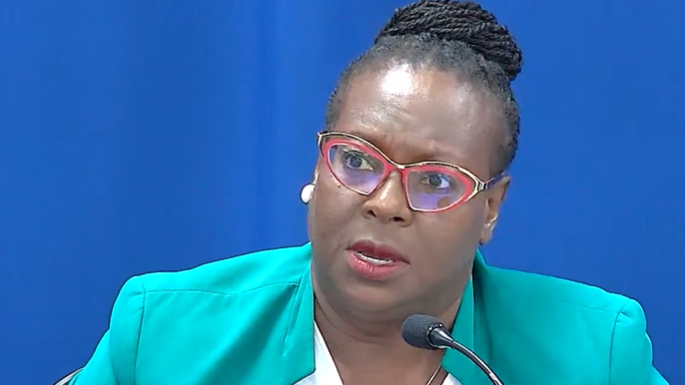Barbados Secondary Schools Entrance Exam: Mixed Results Revealed with Increased Public School Allocations

June 25, 2024
Barbados Secondary Schools Entrance Examinations (BSSEE) results show a mix: slight national mean score declines but more public school allocations. Minister McConney highlights areas for improvement and plans for student support.
The Barbados Secondary Schools Entrance Examinations (BSSEE) has revealed a mixed bag of results this year, with slight declines in national mean scores but an increase in public school allocations.
The figures found ministry officials scrambling to pick positive highlights at a press briefing on Monday but declining to disclose more of the top performers, deviating from the custom.
Minister of Education Kay McConney announced that 96.1 per cent of students who sat the exam, commonly known as the 11-plus or Common Entrance Exam, were allocated to public secondary schools – up one percentage point from 95.4 per cent in 2023. But the national mean scores slumped, with Mathematics falling to 54.62 per cent from 59.2 per cent last year, and English decreasing to 65.2 per cent from 69.5 per cent.
The exam, which returned to its original May administration period, was held on May 7 across 21 public secondary schools. Students from 68 public primary schools and 26 private primary schools were registered, although the total number of examinees was 252 fewer than in 2023.
McConney addressed the performance statistics: “On in-depth analysis, the performance of students in Mathematics and English demonstrates the important need for us to look at how we teach the basics and how children relate to what they are learning.”
She announced plans to support students’ learning, including a free summer school programme for identified Class Four students with deficiencies in basic numeracy and literacy skills.
The minister also emphasised the need for ongoing support in secondary schools: “We want our principals to really double down on meeting regularly with their management teams to effectively plan instruction and to assess the skills and competencies of their students, so that plans and programmes can be designed with those students’ needs in mind.”
McConney stressed the importance of tailored instruction.
“It cannot just be a case of continuing, and what a child gets, [he or she gets] from the regular programmes,” she said. “It has to be that we are paying attention, that we are vigilant, and that we are being intentional in how we design instruction to suit their needs.”
Despite the overall decline, there were notable individual achievements, dominated by two of the nation’s private schools. Aryanna Bascombe from Providence School and Finn Graham from St Winifred’s School emerged as the top performers, each scoring 99 per cent in Mathematics and 96 per cent in English, with an A in Composition, resulting in overall scores of 246.81 A.
Other high achievers included Zamara Dottin from The Rock Christian Primary School (246.61 A), Chanel Lewis from the public Good Shepherd Primary School (245.53 A), and Jayesh Whitehead from Bridgetown Seventh Day Adventist School (244.59 A).
In Mathematics, nine students scored full marks, down from 35 in 2023 but up from two in 2022. Five students scored zero, compared to four last year.
The minister highlighted a decrease in requests for special assistance during the exam, with 138 requests this year compared to 180 in 2023. She attributed this to proactive measures.
“Increasing the frequency and availability of appropriate testing for our students and continuing the diagnostic testing of students for hearing and sight, which we did over the last several years, is an attempt for us to identify and provide early intervention for these students,” she said.


